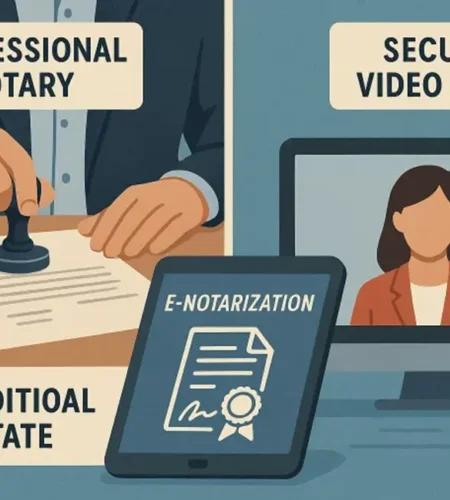Importance of Notaries Public
Notaries public serve as essential guardians of trust and accountability in countless everyday transactions. Acting as impartial witnesses, these professionals help ensure the integrity of critical documents by verifying that signatures are made freely and by the appropriate individuals. This neutral verification establishes a clear record of authenticity, which is indispensable in our increasingly complex and interconnected world, where trust is foundational. Individuals and businesses seeking dependable notarial solutions or considering a career as a notary can consult the Florida notary website, which connects users directly to commissioned notaries and supplies tailored to state-specific requirements.
By offering their presence as an independent, legally recognized authority, notaries public add a crucial layer of security to transactions with significant financial or legal impact. Whether it involves validating property transfers, confirming the legitimacy of corporate documents, or certifying personal agreements, their work is a robust bulwark against fraud and forgery. Notaries deter deception by ensuring that the identities of all participants are verified and that all signatures are genuine and voluntary.
Responsibilities of a Notary
The fundamental responsibilities of a notary public encompass much more than the simple application of a stamp or seal. Each task requires acute attention to detail and a solid understanding of relevant laws and regulations to ensure the validity and enforceability of notarized documents. Notaries public are empowered by law to perform several key functions, each crafted to safeguard the integrity of legal acts:
- Verify Identities: Notaries must scrutinize government-issued identification and other credentials to authenticate each signer’s identity, thus protecting against increasingly sophisticated forms of identity theft and fraudulent impersonation.
- Witness Signatures: Acting as witnesses, notaries confirm that documents are executed in line with all legal requirements, ensuring that participants understand what they are signing and that no party is under duress or undue influence at the time of signing.
- Administer Oaths and Affirmations: In cases where the law demands absolute honesty, such as affidavits or depositions, notaries administer binding oaths or affirmations, holding signers accountable for the truthfulness of their statements under penalty of perjury.
- Certify Copies: Notaries have the authority to attest that photocopies of official documents—which often cannot be recertified elsewhere—are true, exact duplicates of the originals. This service is particularly important for vital records and legal evidence.
While the specific functions may vary by jurisdiction, what remains consistent is the level of vigilance, professionalism, and impartiality expected from notaries. Inattention or minor errors can invalidate documents, invite legal scrutiny, or expose notaries to liability. As trusted third parties, notaries must maintain confidentiality and act with the highest ethical standards, ensuring that every transaction they oversee is legally sound and voluntary.
Notaries in Different Sectors
The indispensable nature of notaries extends across a wide range of industries, where their impartial expertise supports the legitimacy and enforceability of documents fundamental to commerce, justice, and personal affairs. A deeper look into their cross-sector roles highlights how notaries adapt their skills and knowledge to serve industry-specific needs with precision:
- Real Estate: Every major step in real estate—whether buying, selling, or financing property—relies on notarized documents. From mortgages and refinancing agreements to property deeds and escrow instructions, the presence of a notary minimizes the risk of disputes, fraudulent transfers, and title defects. This assurance builds confidence among buyers, sellers, lenders, and real estate professionals alike, ensuring that major investments are protected by the law.
- Legal: Legal professionals regularly depend on notaries to legally bind documents such as affidavits, powers of attorney, and estate planning instruments (like wills and trusts). Notaries ensure these critical records comply with statutory requirements, making them reliable evidence in court proceedings and other formal settings. Judicial systems frequently rely on notarized statements to resolve issues swiftly and justly.
- Business: Notarization is essential to transactional integrity in the business world. Corporations and entrepreneurs require notaries to validate partnership agreements, board resolutions, and transaction documents, including loan contracts, vendor deals, and mergers. This external authentication reduces internal disputes and bolsters a company’s confidence when transacting domestically and internationally.
By serving as independent, credible arbiters, notaries public instill assurance in all parties to an agreement, whether individuals managing personal affairs or organizations driving multi-million dollar deals. Their unique role in maintaining transparency and legal certainty benefits the involved parties and the broader economy and judicial system at large.
Future of Notarization
Looking ahead, ever-evolving technological and regulatory landscapes will define the future of notarization. Emerging tools, particularly blockchain and artificial intelligence (AI), stand to reinvent how notarial acts are performed, recorded, and accessed. Blockchain technology offers a decentralized and tamper-proof ledger system, ensuring that every notarized document has a permanent, immutable record of its creation and signing. This verification level is incredibly valuable in legal and financial transactions, where absolute certainty is required.
Simultaneously, AI-powered platforms are being trialed to streamline client onboarding and document checks. These platforms will make notarial work faster and less prone to human error while freeing notaries to focus on complex matters such as identifying potential fraud or undue influence. Such innovations boost operational efficiency and offer strong protection against cyber threats, identity theft, and data breaches. Society’s growing reliance on digital infrastructure heightens the expectations for both the scope and skill set of future notaries. Remaining relevant will require notaries to be conversant with legal requirements and advances in technology and security.


Comments